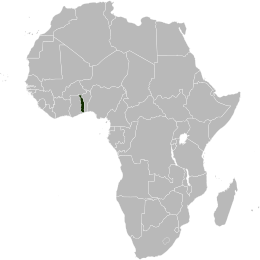কমন্স:অঞ্চল অনুযায়ী কপিরাইট নিয়মাবলী/টোগো
|
কপিরাইট নিয়মাবলী: টোগো সংক্ষিপ্ত: COM:টোগো | |
 | |
 | |
| স্থিতিকাল | |
|---|---|
| মানক | জীবনকাল + ৫০ বছর |
| আলোকচিত্র | জীবনকাল + ২৫ বছর |
| নামবিহীন | প্রকাশকাল + ৫০ বছর |
| অডিওভিজ্যুয়াল | প্রকাশকাল + ৫০ বছর |
| সমষ্টিগত | প্রকাশকাল + ৫০ বছর |
| Applied art | জীবনকাল + ২৫ বছর |
| অন্য | |
| প্যানোরামার স্বাধীনতা | Only allowed through film and television broadcasting |
| শর্তাবলী বছরের শেষ পর্যন্ত চলে | হ্যাঁ |
| সাধারণ লাইসেন্স ট্যাগ | {{PD-Togo}} |
| চুক্তি | |
| বার্ন কনভেনশন | ৩০ এপ্রিল ১৯৭৫ |
| Bangui Agreement | ৮ ফেব্রুয়ারি ১৯৮২ |
| ডব্লিউটিও সদস্য | ৩১ মে ১৯৯৫ |
| ইউআরএএ পুনরুদ্ধারের তারিখ ১ | ১ জানুয়ারি ১৯৯৬ |
| ডব্লিউআইপিও চুক্তি | ২১ মে ২০০৩ |
| ১A work is usually protected in the US if it is a type of work copyrightable in the US, published after 31 December ১৯২৮ and protected in the country of origin on the URAA date. | |
This page provides an overview of copyright rules of Togo relevant to uploading works into Wikimedia Commons. Note that any work originating in Togo must be in the public domain, or available under a free license, in both Togo and the United States before it can be uploaded to Wikimedia Commons. If there is any doubt about the copyright status of a work from Togo, refer to the relevant laws for clarification.
প্রেক্ষাপট
In 1884, Germany declared a region including present-day Togo as a protectorate called Togoland. After World War I, rule over Togo was transferred to France. Togo gained its independence from France on 27 April 1960.
Togo has been a member of the Berne Convention since 30 April 1975, the Bangui Agreement since 8 February 1982, the World Trade Organization since 31 May 1995 and the WIPO Copyright Treaty since 21 May 2003.[1]
As of 2018 the World Intellectual Property Organization (WIPO), an agency of the United Nations, listed Law No. 91-12 of June 10, 1991 on the Protection of Copyright, Folklore and Related Rights as the main copyright law enacted by the legislature of Togo.[1] WIPO holds the text of this law in their WIPO Lex database.[2] The law is retroactive: "Any provisions that contradict this Law are hereby repealed".[91-12/1991 Article 119]
সাধারণ নিয়মাবলী
Under Law No. 91-12 of June 10, 1991,
- Copyright shall exist for the lifetime of the author and 50 calendar years from the end of the year of his death.[91-12/1991 Article 36]
- For a collaborative work, the only date taken into account to calculate the term shall be the date of death of the last surviving collaborator.[91-12/1991 Article 36]
- Copyright shall exist for 50 calendar years from the end of the year during which the work was lawfully made available to the public in the case of anonymous or pseudonymous works, cinematographic works, posthumous works and collective works.[91-12/1991 Article 37(a)]
- Copyright shall exist for 25 years from the end of the year of death of the author in the case of photographic works or applied arts.[91-12/1991 Article 37(b)]
Currency
আরও দেখুন : কমন্স:মুদ্রা
Unsure West African CFA franc used in Togo has close ties to France. French Cour de Cassation ruled in 2002 that franc is not covered by Copyright Law[3], but it is not known if it also applies to West African CFA franc.
See also: COM:CUR France
বিস্তৃত দৃশ্যের স্বাধীনতা
আরও দেখুন : কমন্স:বিস্তৃত দৃশ্যের স্বাধীনতা
ঠিক না. Reproductions of artistic works are only allowed through film and television broadcasting if the works are permanently located in public places, not photographs.
- The reproduction in a film or television program or public communication of figurative works of art or architecture that are permanently located in a public place or included in the film or program in a way that is incidental to the main subject, shall be lawful.[91-12/1991 Article 24]
Domaine public payant
আরও দেখুন : Commons:Paying public domain
On expiration of the terms of protection referred to in this Law, the author's works shall enter the public domain. The right of exploitation of works in the public domain shall be administered by the Copyright Office of Togo (BUTODRA).[91-12/1991 Article 64] The public performance and reproduction of such works shall require authorization by the said body. That authorization shall, in the case of an event held for profit making purposes, be granted against payment of a royalty calculated according to the gross revenue from the exploitation. The amount of the royalty shall be equal to half of that usually payable for works in the same category of the private domain for the period of protection. The proceeds from that royalty shall be used for cultural and social purposes for the benefit of Togolese authors.[91-12/1991 Article 65]
লোকচার
Folklore shall belong originally to the national cultural heritage. For the purposes of this Law, "folklore" shall mean all literary and artistic productions created in Togo by anonymous, unknown or forgotten authors presumed to be of Togolese nationality or from ethnic Togolese communities, passed from generation to generation and constituting one of the basic elements of the Togolese cultural heritage.[91-12/1991 Article 66] There shall be no time limit on the protection of works of national folklore.[91-12/1991 Article 67] The public performance and reproduction by any means whatsoever of national folklore with a view to exploitation for profit making purposes shall be subject to prior authorization by the Copyright Office of Togo (BUTODRA), against payment of a royalty.[91-12/1991 Article 69]
See also
উদ্ধৃতিসমূহ
- ↑ a b Togo Copyright and Related Rights (Neighboring Rights). WIPO: World Intellectual Property Organization (2018). Retrieved on 2018-11-04.
- ↑ Law No. 91-12 of June 10, 1991 on the Protection of Copyright, Folklore and Related Rights. Togo (1991). Retrieved on 2018-11-04.
- ↑ [১]